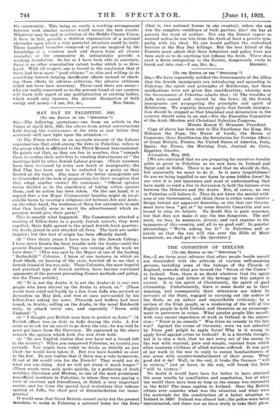MAY DAY IN PALESTINE, 1921.
(To THE EDITOR OF THE " SPECTATOR.") Ste,—The following quotations—one from an article in the Times of April 28th, 1921, the others from actual conversations held during the continuance of the riots or just before they occurred—will cast light upon the situation :— (1) The Times writer, in an accurate account of the Labour organizations that exist among the Jews in Palestine, refers to the group which is affiliated to the Third Moscow International. He points out that, as they are few in number, this " compels them to confine their activities to creating disturbances at " the meetings held by other Jewish Labour groups. (Their numbers have been increased by every new batch of immigrants; the Red Flag has been seen to be unfurled by a party as they landed on the beach. Also many of the better immigrants are so dissatisfied at the lack of preparation for their reception that they adopt similar views.) He continues : " Official opinion seems divided as to the expediency of taking action against them; and no action has been taken. On the one hand, it is argued that a few Mopsi (Communist) fanatics might do incal- culable harm by causing a religious riot between Jew and Arab; on the other hand, the weakness of these few extremists is such that they hardly seem to merit the advertisement which re- pression would give their party."
This is exactly what happened. The Communists attacked a meeting of fellow-Jews in a purely Jewish suburb; they were expelled; their fight spread to the mixed Jewish-Arab quarter; the Arabs joined in and attacked all Jews. The facts are under inquiry; but this fact of origin has been officially stated.
(2) " Over thirty years I have been in this Jewish Colony; I have never known the least trouble with the Arabs—until the present Zionist movement. They are ruining all the work we have done." (This was said by the Mayor of one of the leading " Rothschild " Colonies. I know of one instance in which an Arab Sheik, on hearing of the riots, hurried off to see that a Jewish friend of his was safe. These Colonists, the most hopeful and practical type of Jewish settlers, have become convinced opponents of the present prevailing Zionist methods and policy. See the Times article.).
(3) " It is not the Arabs, it is not the Arabs—it is our own people who have stirred up the Arabs to attack us." (These words were cried out loudly by a Jew from Jaffa who arrived at Jerusalem on May 2nd, and was at once surrounded by his fellow-Jews asking for news. Placards and leaflets had been issued, in Arabic, calling on the Arabs, in the usual Bolshevik style, to attack every one, and especially "Down with England! ")
(4) " I thought you British were here to protect us Jews." (A British officer was on duty in Jaffa during the riots. A Jew came us to ask for an escort to go down the city; he was told he must get leave from the Governor. He expressed in the above remark the opinion which both Jew and Arab hold.
(5) "Do you English realize that you have not a friend left in the country? When you conquered Palestine, we trusted you entirely. You might have ruled us Arabs as strictly as you liked—We would have taken it. But you have handed us over to the Jew. Do you realize that if there was a vote to-niorrow, 99 out of 100 would vote for the French? They would not do what you are doing. And we will not stand it much longer." (These words were said, quite quietly, by a gathering of Arab notables, Christian and Moslem, to one of the most prominent non-official residents in Palestine, to whom they were paying a visit of courtesy and friendliness, at Safed, a very important centre, and far from the special local irritations that inflame opinion at Jaffa, the chief port of disembarkation for immi- grants.) It would seem that Great Britain cannot carry out the present mandate, to make in Palestine a national home for the Jews (that is, two national homes in one country), unless she can win the complete confidence of both parties; alas! she has at present the trust of neither. Nor can the Zionist expect to succeed unless he can win from the Arab at least a passive sym- pathy with his ideal. No one would palliate the undoubted horrors of the May Day killings. But the best friend of the Zionists must admit that their behaviour and policy have not been such as to do anything but inflame the Arab. There does exist a fierce antagonism to the Zionist, dangerously ready to
break out into riot.—I am, Sir, &c., RESIDENT.


































 Previous page
Previous page